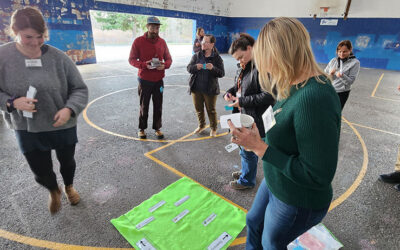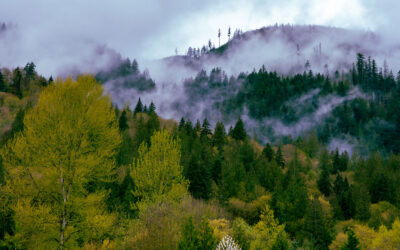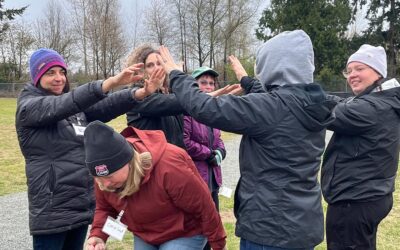Teaching for the Climate Collaborative
Four CBO partners make up the Teaching for the Climate Collaborative: Common Threads Farm, Nooksack Salmon Enhancement Association (NSEA), RE Sources: Sustainable Schools, and Wild Whatcom. The four CBO partners who specialize in school gardens, salmon recovery, natural resource conservation, and nature immersion provide experiential education that gets students outside, keeps lessons place-based, and teaches hope and resilience, respect, and conservation of nature.
Teacher Professional Development
The Teaching for the Climate Collaborative (TCC) aims to support teachers in bringing both the outdoors and climate change education into their classrooms through teacher professional development workshops. TCC is hosting two types of workshops this year: Teaching Outside and Hope & Resilience. Each of these offers four different stand-alone, field-based workshops throughout Whatcom County.
The Teaching Outside workshops are for Whatcom County K-5 teachers and staff who would like to gain skills to incorporate the outdoors and climate education into their lessons. Participants will gain basic skills and tools to implement experiential activities on school sites, in local parks, and in urban settings.
Outdoor education does more than just help students tune in to their surroundings and gain an appreciation for the natural world. It also brings what they learn in the classroom to life through application and observation while contributing to personal and social development.
The Hope & Resilience workshops are for educators of grades 3-12 who want to connect real-world solutions to climate change. They will experience how local tribes, farms, and nonprofits are advancing climate solutions that can inspire hope and resilience in the classroom.
These field-based workshops focus on equitable solutions currently being implemented in Whatcom County. Participants will participate in classroom-ready STEM activities that illustrate how climate change is affecting different stakeholders and ecosystems. Community members will share their expertise in developing solutions. Together, participants will co-design ways to bring engineering design solutions into the classroom.
The workshops are designed to answer the following questions:
- What are the climate change effects on specific ecosystems (farms, freshwater, marine, forests)?
- What community members, tribes, CBOS, etc. are doing about it in Whatcom County?
- What are the Indigenous Ways, currently and since time immemorial, of engineering to solve these issues?
- How do you bring Engineering Design solutions into your classroom based on what you learned today?
Partners & Collaborators
Common Threads
RE Sources
Nooksack Salmon Enhancement Association
Wild Watcom
Lummi Nation
Northwest Indian College
NW ESD 189
Teaching for the Climate Sessions
Teaching Outside
For K-5 teachers and staff. Two stand-alone field-based sessions offered this school year:
Session 1
Thurs, March 21, 4:30-6:30pm
Register by: 5pm, March 11, 2024
Register through PD Enroller >
Session 2
Thurs, April 25, 4:30-6:30pm
Register by: 5pm, April 15, 2024
Register through PD Enroller >
Teaching for the Climate - Hope and Resilience
For educators of grades 3-12. Three stand-alone field-based workshops offered this school year:
Watersheds and Salmon
Sat, Feb. 10, 9-1pm
Register by: 5pm, Feb. 2, 2024
Register through PD Enroller >
Circular Economies
Sat, Feb. 24, 9-1pm
Register by: 5pm, Feb. 16, 2024
Register through PD Enroller >
Bring it to the Classroom
Thurs. Mar. , 7, 4:30-6:30pm
Register by: 5pm, Feb. 21, 2024
Register through PD Enroller >
Success Stories from TCC
Teaching Outside: Teachers engaging students in outdoor learning
Whatcom County elementary educators gathered at local schools to engage in the Teaching for the Climate Collaborative’s 2-hour experiential and place-based Teaching Outside course on March 21, 2024 and April 25, 2024. This course is designed to provide teachers with...
Forests and Climate Resilience
It’s difficult to see hope and resilience when glaciers are melting, salmon populations are dwindling and sea levels are rising. But there are efforts to make our planet more resilient all across the planet and right in our own backyards. And that is a reason for...
Teaching for the Climate: Inspiring teachers to engage students in outside learning
The blustery winds of October, the ice encrusted fields of February, and the pelting rain of March and April, provided the backdrops for the Teaching for the Climate Collaborative's four stand-alone Teaching Outside workshops. Ironically, the weather was the perfect...



